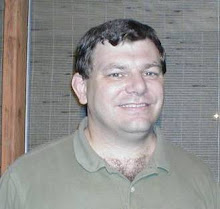Well, I set up this blog two weeks ago and haven't posted anything yet--mainly because I was waiting until I had the energy to post a comprehensive introductory post. I eventually realized that that's a bit ridiculous, since (1) I haven't told anyone except my wife of the blog's existence yet; (2) anyone whom I tell about the blog will likely know something about me already; and (3) I will not have the time to write a full-length memoir and tell-all in the foreseeable future.
So here's my first post. My intention is to use the discipline of blogging as a way to process ideas and bring clarity to my own mind. For that purpose, whether others read and/or comment is not that important. But if people do read and interact, this will bring a second benefit to me and hopefully to others, the chance to have a community of folks as a sounding board for my ideas.
My posts will mostly cover the intersection of theology, spirituality, and politics--and those three areas have been converging in my life in recent years. Raised as a Christian evangelical in West Texas, my tendency is to keep those three areas of my life greatly separated. Theology was done at church, spirituality was done during church youth group gatherings outside the worship hour, and politics was done elsewhere (this was before the religious right brought politics back to the churches).
My journey has taken me to an Master of Divinity degree from an evangelical school; a six-year, part-time pastorate at a small, rural African-American church; a four-year, difficult pastorate in the San Francisco Bay Area; and six years doing volunteer ministry and working in financial services in Spokane, Washington.
In August 2005, my wife Stacey and I moved to a metro area that seems finally to fit our personality and passion--the Portland, Oregon area, where I work in software marketing and Stacey does artistic woodworking, volunteer work, advocacy, and loving care of our dog, cat, and eight birds. We are blessed to be a part of the faith community at Southminster Presbyterian Church, where we both serve as deacons, Stacey is very active in mission and eco-justice activities, and I am spearheading a project to expand our adult education offerings. We are blessed to be a part of a church that allows for, in Stacey's words, "theological elbow room." Stated another way, Southminster is the first church I've joined in my adult life at which I'm not the most liberal thinker.
So faith, politics, and spirituality are converging for me, and it has been an exciting adventure. Our years in Spokane and the George W. Bush administration have been the primary catalysts for this change. Spokane is a difficult place to live if you're not a life-long resident who has not seen the larger world, and we found it to be stagnant in every way--spiritually, socially, materially.
Bush's presidency brought the same stagnation to the nation as a whole. There is scarcely a single action that he has taken that is not blatantly contrary to the teachings of Jesus, yet his base of support is the religious right--a group I previously dismissed with a chuckle. But then they took control of all of our political institutions, effectively squelching the spiritual revival of the 1990s and exchanging it for government power. I am hopeful that last month's elections will bring a measure of sanity to our government and our spiritual life as a nation, but this will require a bit more gumption than Democrats have typically shown.
I am greatly hopeful for the future, however. Spiritual progressives are beginning to reach a critical mass, and will be much more influential over the next 25 years than they have been in the last 25.
On the social justice front, movements such as Sojourners on the evangelical side and Tikkun on the liberal side--after languishing on the margins for 25 years--are now growing exponentially. In both 2004 and 2006, evangelicals under 30 years of age rejected the unholy marriage of the political right with the religious right, and majorities of them voted Democratic--despite the fact that that party has not fully figured out why it needs to affirm spirituality in its platform.
On the religious side, dynamic progressive churches are beginning to grow and gain notice. A better theology for our time is being articulated by people of faith such as Brian McLaren on the evangelical side and Marcus Borg on the liberal side, and there are a lot of things that might bring these two wings of the church closer together. Discovering these things has been one of the joyful events of the past year for me.
These things make me hopeful, but there is a lot of work left to do. I'm hoping that the ability to process my thoughts here will help in the larger effort to bring transformation to our nation and to the world. This, after all, is what Christianity was originally all about.
Sunday, December 10, 2006
Subscribe to:
Post Comments (Atom)

No comments:
Post a Comment